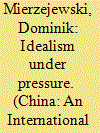| Srl | Item |
| 1 |
ID:
192113


|
|
|
|
|
| Summary/Abstract |
The paper aims to discuss China’s behavior in the developing world through the lens of the domestic model of governance. It does so by seeking analogies between three forms of Beijing’s political approaches in domestic affairs: generating enthusiasm through slogan politics and promised incentives, informal networks, and coordinated development in China-led multilateralism with Africa and Central and Eastern Europe. By discussing the domestic-foreign policy nexus, the paper introduces the concept of China’s vertical multilateralism. Finally, by broaching a new theoretical understanding, the paper decodes China’s behavior in the regions mentioned above and provides an alternative model for understanding China’s foreign policy in the developing world.
|
|
|
|
|
|
|
|
|
|
|
|
|
|
|
|
| 2 |
ID:
109483


|
|
|
| 3 |
ID:
172280


|
|
|
|
|
| Summary/Abstract |
The growing role of local governments and municipalities in international relations has become a significant trend that has shaped new dynamics in global affairs. By analysing Guangdong's subnational diplomacy and Guangzhou city's diplomacy activities, this article aims to investigate whether, and to what extent, Chinese provinces, autonomous regions and municipalities possess the freedom to act independently in planning, organising and managing their internationalisation processes. The article also debates the growing role of centralisation inside China and its impact on shaping local governments international activities. Using the case study of Guangdong and Guangzhou, the author examines the following questions: How do both provincial and local governments conduct their activities under China's foreign policy framework? How does the Belt and Road Initiative (BRI) impact the foreign activities of Guangdong and Guangzhou? Does China's central government attempt to make the division of labour among different provincial and city governments and how do both perceive themselves under the BRI "umbrella"? Through the analysis of the city, bilateral and multilateral activities and interviews conducted in Guangzhou and Guangdong Foreign Affairs Offices as well as with diplomatic personnel of the foreign countries, the author explores the dual-usage of city diplomacy in China's foreign policy from both economic and local development-oriented goals to its strategic role in regional and global affairs.
|
|
|
|
|
|
|
|
|
|
|
|
|
|
|
|